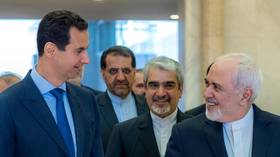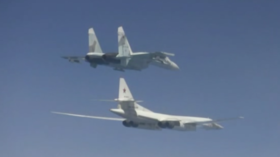Syria & Iran slam US ‘economic terrorism,’ urge diplomacy

Leaders of Syria and Iran accused the United States of “economic terrorism” for using sanctions, calling instead for more actual diplomacy from the West.
Speaking at a meeting with Iranian Foreign Minister Javad Zarif in Damascus, Syrian President Bashar Assad said the United States should pursue diplomacy with countries it has disagreements with, instead of waging wars or levying sanctions.
At the meeting, which focused on tensions with the United States, Zarif said the American designation of Iran’s Revolutionary Guard as a terrorist organization was a “stupid” move.
Assad said the designation was “irresponsible,” adding that it “is a continuation of the wrong policies adopted by the United States and could be considered as one of the factors of instability in the region.”
Also on rt.com US labels Iran’s Revolutionary Guards as ‘terrorists’. But who are they?Zarif and Syrian Prime Minister Imad Khamis, who met later in the day, stressed the “importance of constant coordination” between them in light of western sanctions against their two countries. Both war-torn Syria and Iran are gripped by a fuel crisis, caused in no small part by US-led sanctions against their energy sectors.
Washington currently levies sanctions on a number of Syrian and Iranian entities. Over the summer of 2018, after the Trump administration abrogated the JCPOA nuclear pact with Iran, sanctions were reintroduced on the country’s banking sector, industrial software producers, as well as on Iran’s coal and auto industries. Additional sanctions were imposed on Iran’s oil sector in November.
The sanctions against Syria date back to the outbreak of civil war in 2011, and have contributed to crippling the ability of Damascus to produce and sell oil. Prewar Syrian oil production stood around 350,000 barrels per day, which has now diminished to just 24,000. The sanctions also include restrictions on foreign trade and investment in Syria, as well as asset freezes on certain state officials.
Like this story? Share it with a friend!














